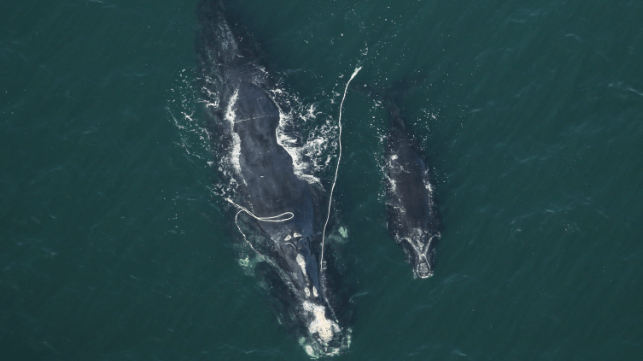Maine Lobstermen Sue Monterey Bay Aquarium Over Right Whale Claims

Maine's lobstermen are suing the Monterey Bay Aquarium's Seafood Watch program for listing their fishery as a threat to endangered North Atlantic right whales, and they are demanding that the watchdog group retract its assessment and pay monetary damages.
Last year, Seafood Watch updated its fishery assessments and determined that based on the available evidence, Maine lobster pot lines likely cause North Atlantic right whale entanglements, contributing to the whale species' slide towards functional extinction. The listing prompted the Marine Stewardship Council (MSC) to remove Maine lobster from its sustainable-seafood list, and leading retailers like Whole Foods followed suit and withdrew the crustacean from their stores.
The Maine Lobstermen's Association asserts that Seafood Watch's claims are false, unscientific and defamatory, and that there is no evidence that any right whales have been killed by a pot line proven to originate in Maine in decades.
There are about 340 North Atlantic right whales left, and marine biologists believe that the survival of the species is now down to the survival of each individual - especially the 88 identified females of breeding age. Marine scientists assess that the allowable take rate for avoiding extinction is less than one whale per year, and the current human-caused mortality rate is about eight whales per year. The species is on track to reach the point where extinction is inevitable by about 2040, according to marine scientists.
Fishing gear entanglement is the leading cause of right whale death, and according to Seafood Watch, an average of about 2.6 individuals per year are found injured in American waters with gear of untraceable origin. Until late 2021, there were no federal line marking requirements that would identify the state or fishery where any given section of line came from.
Revised federal regulations now require lobstermen to mark their gear with distinctive colored patterns on the top and bottom ends of the line, including a color corresponding to the operator's state of origin - in Maine's case, purple. Several minke whales and at least one humpback whale have been found entangled in the distinctive purple-marked line since it entered use, a NOAA spokesperson told the Portsmouth Herald last year - though no right whales.
According to the lobstermen's association, Maine's lobster pot gear is not responsible for right whale entanglement because the whale population has moved further away from Maine lobster fishing grounds. Further, the group notes that Maine's lobstermen have adopted weaker pot lines in order to help a whale break free, as required by revised federal regulations.
“This is a significant lawsuit that will help eradicate the damage done by folks who have no clue about the care taken by lobstermen to protect the ecosystem and the ocean,” stated co-plaintiff John Petersdorf, CEO of Bean Maine Lobster Inc. "Lobstermen are very responsible stewards of the ocean. We cannot sit back and let lies to the contrary prevail.”
Seafood Watch has previously pushed back on the calls from the lobstermens' association and the Maine congressional delegation, which is united in opposition to regulations on pot lines. In particular, Seafood Watch has pointed to the federal government's own assessments in justifying its rating.
"In assessing the American lobster trap/pot fishery, Seafood Watch reviewed all publicly available data, including the latest government stock assessments, peer-reviewed science, and all state and federal management measures. Taken together, the information showed current measures do not go far enough to meet the legal requirements of the Endangered Species Act and the Marine Mammal Protection Act," Seafood Watch noted last year. "Specifically, NOAA determined that current Canadian and U.S. approaches would allow impacts from fishing entanglement to continue at levels at least five times higher than the North Atlantic right whale population could withstand."
